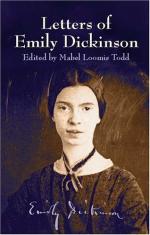|
This section contains 5,836 words (approx. 20 pages at 300 words per page) |

|
SOURCE: '"Compound Manner': Emily Dickinson and the Metaphysical Poets," in On Dickinson: The Best from American Literature, edited by Edwin H. Cady and Louis J. Budd, Duke University Press, 1990, pp. 52-68.
In the following essay, Farr traces the influence of seventeenth-century metaphysical poets, such as John Donne and George Herbert, on Dickinson's verse.
The habit of Emily Dickinson's mind led her, like George Herbert, to construct a "Double Estate" in which this world was "furnished with the Infinite," in which God was her "Old Neighbor," and death, agony, and grace were fleshly companions. The discipline that wrought many of her poems was the metaphysical one of a "Compound Vision" by which the eternal is argued from the transient, the foreign explained by the familiar, and fact illumined by mystery. She could speak of "Infinite March," of Calvary as another Amherst, of the "Diagram—of Rapture" because she...
|
This section contains 5,836 words (approx. 20 pages at 300 words per page) |

|


